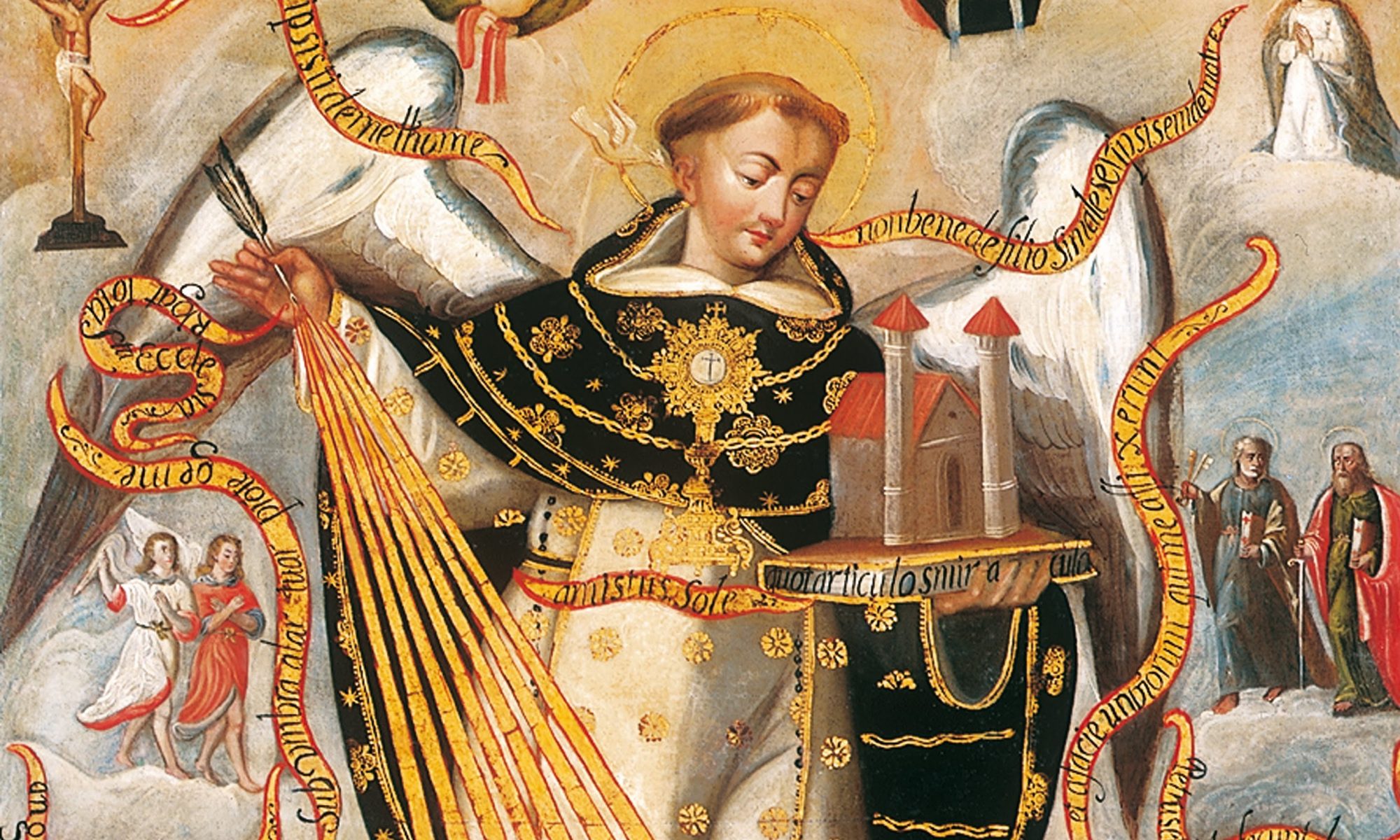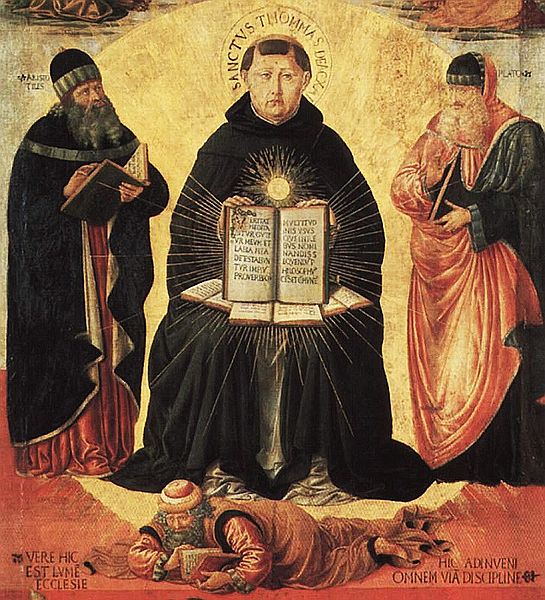Essentially, human beings in their very nature unceasingly desire the good. Thus, the good seems to become the goal, the purpose, and the end of human beings. Accordingly, it is very important to conceive rightly the true good and the proper means to the true good. In the era of the ancient world, Aristotle, the Hellenic philosopher with great timeless notions, reasonably pointed out that happiness is the highest good. Also, he states “happiness is a certain sort of activity of the soul in accord with virtue.”[1] Thus, virtues are necessary conditions for the soul to function well so that men can obtain the ultimate good. There are two types of virtues, the virtues of character and the virtues of mind. Among the virtues of character, magnanimity is the greatest. This virtue makes men worthy of great things. Nevertheless, in the Catholic tradition, many teachings, such as the Rule of Saint Benedict, encourage the practice of humility, which literally means “becoming little.” Consequently, someone may rapidly judge that men cannot attain both virtues and that one or the other of them must be removed from the list of the virtues. However, it should be proved that this is not the case. That is, magnanimity and humility are necessarily examined in reason and faith to provide the evidence by which we can persuasively claim that magnanimity and humility in their proper senses indeed not only have no contraries but also that they cooperate with one another to set a safe limitation for the irascible appetites.
First of all, it is necessary to specify each virtue in its very concept so that the later arguments can make more sense. Now let us begin by discussing magnanimity in referring to Aristotle and Saint Thomas Aquinas. Simply, there are four states corresponding to magnanimity, such as pusillanimity, vainglory, and modesty. These states can be distinguished in the way people claim their worthiness. In more detail, pusillanimous people claim less while they deserve more. In contrast, vainglorious people claim more while they deserve less. Modest people deserve less and claim less. In a greater state, magnanimous people deserve much and claim much. Therefore, Aristotle states that magnanimity is concerned with great things.[2] Also, he points out that honor is the greatest external good to award the magnanimous person.[3] Hence, magnanimous people are those seeking the honor in the right reason.
Saint Thomas puts this virtue into the subcategory of fortitude due to its mode. Fortitude perfects the irascible appetite which is concerned with the arduous good. More particularly, when one faces a tough challenge, fortitude will lessen the fear and strengthen the daring. Thus, because magnanimity considers honor as its proper object, the honor must contain “the aspect of something great or difficult.”[4] This feature distinguishes magnanimity from vainglory because vainglorious people may not need to struggle with any worthy challenges to achieve the honor. In contrast, to be worthy of the honor, magnanimous people have to attempt with all their capacities; they are even willing to “[face] dangers in a great cause.”[5] Gregory Pine emphasizes this point by quoting from Saint Thomas: “The magnanimous man is not one who seeks out great honors, but one who seeks out the great goods of the soul, great virtues, or, even better, one who accomplishes great virtuous acts.”[6] Hence, magnanimous people do not only merely desire to acquire great things but also eagerly desire to do great acts.
Now, we need to clarify whether magnanimity is a virtue because as noted in the discussion above, magnanimity seems at the extreme degree which according to Aristotle is not a virtue. In Summa Theologiae, St. Thomas clearly specifies why magnanimity is the mean. Precisely, “in point of quantity” it is an extreme because men of this virtue always seek the greatest. However, it is the mean “in the matter of becomingness” because even though men of this virtue always seek the greatest, they never claim more than what they are worth.[7] Hence, magnanimous people indeed tend to the greatest things with right reason, so it must be a virtue.
Subsequently, let us begin the discussion about some attributes of humility by talking about pride, its opposite. Pride refers to excessive self-esteem or self-love. It is one of the seven capital sins. Proud people often exalt themselves and enjoy the praising of others although they are not worthy. In contrast, humility is simply understood as “the notion of a praiseworthy self-abasement to the lowest place.”[8] Thus, a humble man tends to ignore compliments or honors from others. He may do great things without expecting the acknowledgement of others. In his twelve steps in the practice of humility, Saint Benedict points out typical attributes of humility. In detail, a humble man will give up his own will to obey the order of the authority. He is sincere to face his weakness. He often keeps silent, speaks gently if he must say something, and never is ready to laugh. A truly humble man makes himself smallest not just in his appearance but in his heart. Instinctively, pride seems to have the character of either magnanimity or vainglory while humility seems to have the character of either modesty or pusillanimity. Because pride is a vice, it must be equivalent to vainglory. And, somehow humility must belong to the category of modesty so that it is not a vice.
With some ideas of humility, we may conceive that humility restrains the concupiscible appetite. It seems more obvious when Saint Thomas puts humility under the subcategory of temperance, namely “modesty.” He states that the virtue of humility is “to temper and restrain the mind, lest it tend to high things immoderately.”[9] However, it is not the case because the subject of this virtue is not the concupiscible appetite. Precisely, humility sets abound the movements of hope which direct human beings to attempt to obtain the difficult good. Since hope and despair are an opposite pair of the irascible appetites, humility is the virtue rightly moderating the irascible faculties. Hence, humility belongs to the category of temperance because of its mode which suppresses human passions from going over the thresholds. However, its function takes the irascible appetite as the proper subject.
Additionally, I would like to provide the arguments to clarify why humility is a virtue. It sounds as if the notion of lowering oneself is a form of deficiency which is not considered a virtue according to Aristotle. Despite the fact that Aristotle has no discussion on humility, from my point of view, I see humility could be the mean between excess and deficiency. As I have discussed above, the excess of humility is pride which shares some attributes with vainglory. And, the deficiency, as St. Thomas cites from Psalms, is that one “[does not understand] his honor, compares himself to senseless beasts, and becomes like to them.”[10] The point here is that both in the excess and the deficiency one reasons wrongly about what he is and what he deserves. However, a truly humble man will not deny what he is and sincerely face it. Thus, humility may be equivalent to modesty that corresponds to magnanimity as mentioned above. Precisely, a humble one with right reason knows that he deserves little, so he claims little. Hence, humility is a virtue according to Aristotle. Moreover, in St. Thomas’s reason, the human passions can move in two directions. In detail, the passion of hope moves toward the difficult good while the passion of despair moves away from the good. Both directions need something to rightly moderate themselves so that they do not become excessive. As a result, humility is necessary to perfect the passion of hope while magnanimity is necessary to perfect the passion of despair. Hence, no doubt humility is a proper virtue.
Up to this point, I just have given the reason why both magnanimity and humility are virtues. And if both are established on right reason, they cannot be contrary one to the other.[11] However, someone may wonder that if these two virtues seem contrary to one another, it would seem impossible for a person to have both virtues. In other words, if one is humble, then he cannot be magnanimous. In particular, St. Benedict teaches that “every exaltation is a kind of pride”[12] while Aristotle states “magnanimity seems to be concerned with great things.”[13] Therefore, magnanimity may be considered as a kind of pride, which is the opposite of humility. Truly, as we discussed earlier, it is obvious that the operation of these two virtues are contrary in their primary movements.[14] Precisely, humility restrains the appetite while magnanimity encourages the appetite. Consequently, if their functions contradict one another, either of them may not be a virtue.
Nevertheless, it can be proved that magnanimity and humility do not contradict each other; moreover, human passions need both to be in cooperation in order to be perfected. In the light of faith, Saint Thomas points out that there is no real contradiction between these two virtues because “they proceed according to different considerations.”[15] Precisely, on the one hand, if a man is considered with the gifts of God, he can regard himself worthy of doing great things.[16] Indeed, the book of Genesis affirms that human beings are created in the image of God. They are endowed with intellect and will, so they have freedom to decide to act or not to act. And human beings are called to be united with God in his glory. Hence, the virtue of magnanimity will help human beings complete the vocation from God to obtain the ultimate honor that is to be in communion with God. On the other hand, in the consideration of the weakness in human nature, all human beings must humble themselves.[17] Men must know that God made them out of dust to which men will return after death. Also, the Church teaches that although the sacrament of baptism purifies us from all sins, the weakness of human nature still continues to direct men to evil. Thus, it is right for men to regard themselves humble considering the weakness of human nature. Hence, because a man can be both humble and magnanimous at the same time in different considerations, their opposition, mentioned above, is not real.
Furthermore, both virtues are necessary for human passions. As we discussed above, although magnanimity and humility belong to different categories due to their modes, they act on the same subject, which is the irascible appetite. The directions of each are opposite to one another. This may make someone believe at first glance that each of the virtues intends to prevent the other from doing its functions. However, it is not the case because with the right reason they set a safe boundary for one another. St. Thomas asserts that “humility restrains the appetite from aiming at great things against right reason: while magnanimity urges the mind to great things in accord with right reason.”[18] More particularly, magnanimity keeps a humble person from being pusillanimous. In turn, humility keeps a magnanimous person from being vainglorious. Here we can imagine that humility sets the lower threshold while magnanimity sets the upper threshold. As a result, the human appetites never go toward the excess or the deficiency. Hence, magnanimity does not remove the function of humility, but magnanimity cooperates with humility to establish a “safe zone” (a modern phrase, one might say, with Aristotelian sense) in which the irascible appetites rightly move.
Finally, as an illustration, I will describe how one can be both humble and magnanimous when he practices the virtue of humility according to the Rule of St. Benedict. In the twelve steps of humility, obedience is the first. Obedience here is not a form of a punishment because it comes from the heart, an intrinsic principle but not from outside of himself, an extrinsic principle. To be obedient from inside, one acknowledges his deficiency before the greatness of God, and his lower degree before the superior. Above all, this obedience is not in vain because one “will quickly arrive at the perfect love of God.”[19] Besides, to stay in the love of God and to be united with Him are truly the ultimate honor. Hence, obeying the right authority is a proper way to be worthy of that honor, as St. Benedict affirms when he says, “they are so confident in their expectation of reward from God.”[20]
In conclusion, we acknowledge that magnanimity and humility by nature move human appetites in opposite directions. And, although St. Thomas categorizes them into different groups due to their modes, their functions properly impact the same subject, the irascible faculties. In truth, there is not any real contradiction between them because one is considered with the gifts of God, and the other is considered with the deficiency in human nature. Moreover, these virtues simultaneously act on the irascible appetite to perfect it by setting a safe boundary. Hence, one can desire the great honor so that he does not waste the gifts of God; also, he must humble himself so that he does not forget his weak nature.
[1] Aristotle, Nicomachean Ethics, trans. Terence Irwin (Indianapolis, IN: Hackett, 2007), 12.
[2] Aristotle, 56.
[3] Aristotle, 57.
[4] St. Thomas Aquinas, Summa Theologiae, trans. Fathers of the English Dominican Province, art. 1, accessed April 5, 2019, http://www.newadvent.org/summa/3129.htm.
[5] Aristotle, 58.
[6] Gregory Pine, Magnanimity and Humility According to St. Thomas Aquinas, The Thomist 82, no. 2 (April 2018), 269.
[7] St. Thomas Aquinas, art. 3, http://www.newadvent.org/summa/3129.htm.
[8] St. Thomas Aquinas, art. 1, http://www.newadvent.org/summa/3161.htm.
[9] St. Thomas, art. 1, http://www.newadvent.org/summa/3161.htm.
[10] St. Thomas, art. 1, http://www.newadvent.org/summa/3161.htm.
[11] Pine, 285.
[12] St. Benedict, RB 1980: The Rule of St. Benedict in English, trans. Timothy Fry (Collegeville, MN: Liturgical Press, 1982), 32.
[13] Aristotle, 56.
[14] Pine 279
[15] St. Thomas, art. 3, http://www.newadvent.org/summa/3129.htm
[16] St. Thomas, art. 3, http://www.newadvent.org/summa/3129.htm
[17] St. Thomas, art. 3, http://www.newadvent.org/summa/3129.htm
[18] St. Thomas, art. 1, http://www.newadvent.org/summa/3161.htm
[19] St. Benedict, 38.
[20] St. Benedict, 35.







